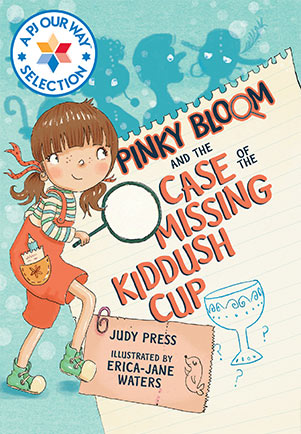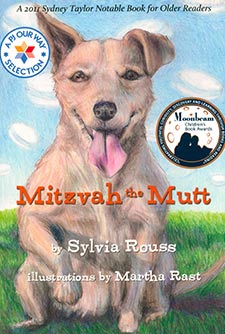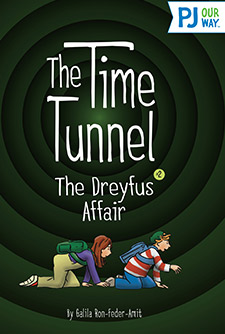Pinky Bloom and the Case of the Missing Kiddush Cup
Penina “Pinky” Bloom loves baseball, Chinese food, and solving mysteries. When someone tries to put her friend’s Chinese restaurant out of business and a valuable Kiddush cup is stolen, it’s up to Brooklyn’s greatest kid detective to catch the culprits!
Average Rating
( hint: Login to leave a review! )
99 Reviews
Leave Review
What the Book is About
Jewish Content & Values
Positive Role Models
Content Advisory
Talk it Over!
More for You
What the Book is About
Pinky loves baseball, solving mysteries, and eating at her best friend Lucy’s kosher Chinese restaurant. When someone starts putting mean fortunes in the fortune cookies and a Kiddush cup and Torah pointer are stolen from the Jewish Museum, Brooklyn’s greatest kid detective has two cases on her hands! With the aid of her little brother Avi, plus Lucy and their friend Madame Olga, Pinky sets out to solve the mysteries – and save her friend’s family business. This is a cute, quick read that’s fun even for kids at a more advanced reading level.
Jewish Content & Values
-
The focus of the story is the theft of a valuable Kiddush cup from the Jewish Museum.
-
Pinky’s family is religious and observes the laws of the Sabbath (Shabbat). The family keeps kosher and says the blessings (brachot) before their Friday night dinner. The transliterated Hebrew blessings for the candles, wine, and bread are included in the scene.
-
Pinky and her brother Ari go to an Orthodox day school where the boys and girls are educated in separate classes.
-
The family lives in a Jewish neighborhood, where there are kosher shops and people use Yiddish phrases.
Positive Role Models
-
Pinky perseveres to solve the mysteries and to help her friend save the family’s restaurant.
-
Madame Olga is a friend of the family and a mentor to Pinky. She helps her solve the mystery by doing research for her and accompanying the children when they need to travel to follow up clues.
Content Advisory
None.
Talk it Over!
When Pinky’s alarm goes off too early, she assumes that her little brother reset it as a prank and doesn’t listen to him when he says he didn’t do it. When it turns out that Avi isn’t the culprit, Pinky apologizes to him of her own accord. Have you ever wrongly accused a sibling of doing something wrong? How did you resolve the situation?
More for You
The tradition of Jews eating Chinese food started in the late 1800s in New York City, when Jewish and Chinese communities lived near each other on the Lower East Side. Unlike some other communities, the Chinese welcomed people from any cultural background to their restaurants, and Chinese food does not contain milk products, so it inherently avoids mixing milk and meat, an important issue for traditional Jews. There were eighteen Chinese restaurants in Jewish areas of New York City by 1935. That year, what was to become a tradition of American Jews eating Chinese food on Christmas Day was first noted in the New York Times, in a report of a Chinese restaurant owner bringing chow mein to the Jewish Children’s Home in Newark, New Jersey on Christmas Day.
What the Book is About
What the Book is About
Pinky loves baseball, solving mysteries, and eating at her best friend Lucy’s kosher Chinese restaurant. When someone starts putting mean fortunes in the fortune cookies and a Kiddush cup and Torah pointer are stolen from the Jewish Museum, Brooklyn’s greatest kid detective has two cases on her hands! With the aid of her little brother Avi, plus Lucy and their friend Madame Olga, Pinky sets out to solve the mysteries – and save her friend’s family business. This is a cute, quick read that’s fun even for kids at a more advanced reading level.
Jewish Content & Values
Jewish Content & Values
-
The focus of the story is the theft of a valuable Kiddush cup from the Jewish Museum.
-
Pinky’s family is religious and observes the laws of the Sabbath (Shabbat). The family keeps kosher and says the blessings (brachot) before their Friday night dinner. The transliterated Hebrew blessings for the candles, wine, and bread are included in the scene.
-
Pinky and her brother Ari go to an Orthodox day school where the boys and girls are educated in separate classes.
-
The family lives in a Jewish neighborhood, where there are kosher shops and people use Yiddish phrases.
Positive Role Models
Positive Role Models
-
Pinky perseveres to solve the mysteries and to help her friend save the family’s restaurant.
-
Madame Olga is a friend of the family and a mentor to Pinky. She helps her solve the mystery by doing research for her and accompanying the children when they need to travel to follow up clues.
Content Advisory
Content Advisory
None.
Talk it Over!
Talk it Over!
When Pinky’s alarm goes off too early, she assumes that her little brother reset it as a prank and doesn’t listen to him when he says he didn’t do it. When it turns out that Avi isn’t the culprit, Pinky apologizes to him of her own accord. Have you ever wrongly accused a sibling of doing something wrong? How did you resolve the situation?
More for You
More for You
The tradition of Jews eating Chinese food started in the late 1800s in New York City, when Jewish and Chinese communities lived near each other on the Lower East Side. Unlike some other communities, the Chinese welcomed people from any cultural background to their restaurants, and Chinese food does not contain milk products, so it inherently avoids mixing milk and meat, an important issue for traditional Jews. There were eighteen Chinese restaurants in Jewish areas of New York City by 1935. That year, what was to become a tradition of American Jews eating Chinese food on Christmas Day was first noted in the New York Times, in a report of a Chinese restaurant owner bringing chow mein to the Jewish Children’s Home in Newark, New Jersey on Christmas Day.



